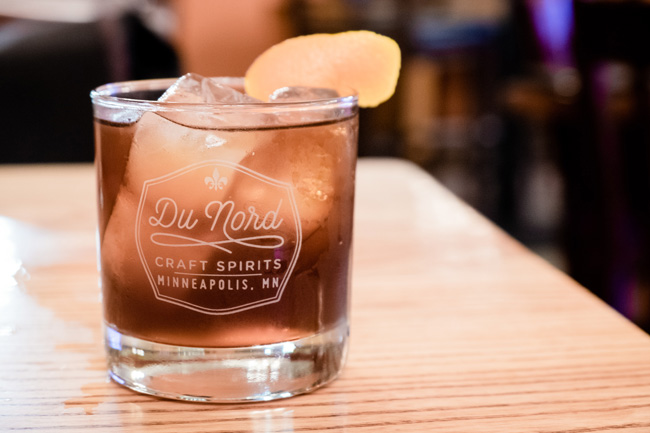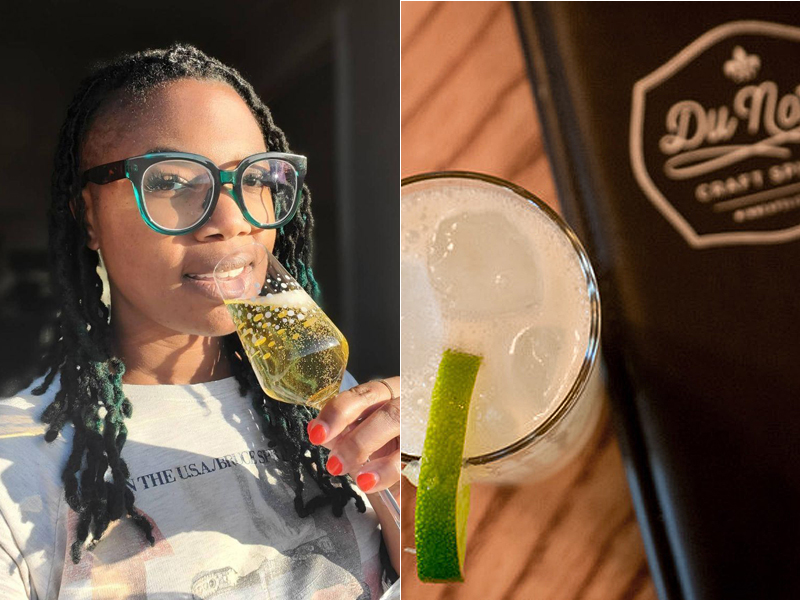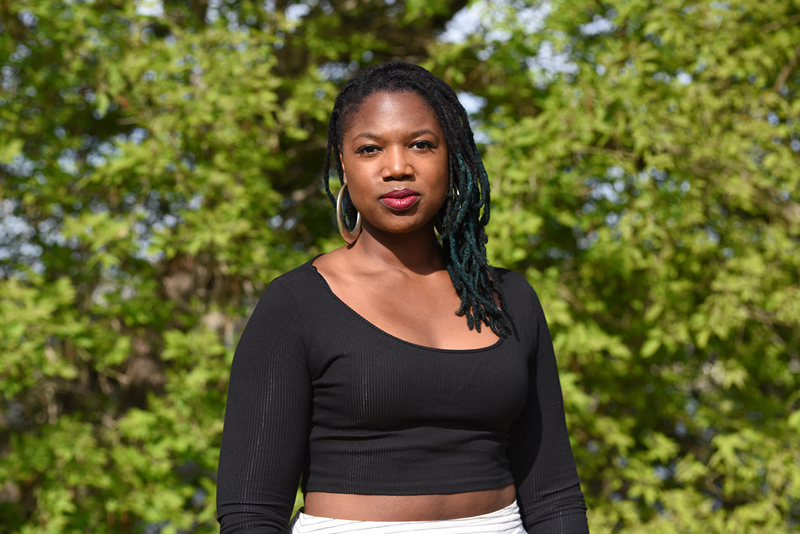PHOTOS BY LOUIS LIVINGSTON GARCIA (PORTRAITS) AND BJORN CHRISTIANSON (COCKTAILS)
This story originally ran in the Tulip and Schooner newsletter, available to Patreon supporters of Heavy Table.
Elle Rhodes is the director and a co-founder of Brewing Change Collaborative (BCC) in the Twin Cities and director of sales for Du Nord Craft Spirits. Through non-profit BCC she helps the industry be more equitable through education and conversation, helps fund scholarships, and has created a place many members call a family for LGBTQ+ and BIPOC who exist both within and outside of the craft beverage industry.
She has worked in sales or in a taproom for eight years, and has been a fan of craft beverages for a lot longer. We chatted with her about her step up to a director role last year, what BCC is up to during a time of turmoil in the industry, and her thoughts on what needs to happen next.
LOUIS LIVINGSTON-GARCIA: Tell me about your new role at Du Nord.
ELLE RHODES: So, I had a couple conversations with Chris Montana, the owner, and we knew each other from kind of connecting with BCC and the conversations happened back and forth for a little bit. And then he offered me the position of director of sales. Because, though being one of the first distilleries in the area, they hadn’t really focused a lot on outward distribution sales, so I came on in September, and it’s been very busy. I’m very happy.
I was thinking just the other day how excited I am not to have to peddle a different flavor of seltzer this summer. I was like, ‘oh my gosh, I love that it’s not a hype industry;’ you make good products and you keep making that good product.
Du Nord specifically is a great place to be and the culture and the environment is awesome. Obviously you know I have cares and thoughts and deep investment into equity in terms of the industry, so obviously that need within myself is being met.
And especially with Du Nord being a Minnesota brand that is relatively small and up until this year had a relatively small footprint but it’s rapidly growing. It is a lot more of sharing our story, and engaging people on what we do, why we do it.
[That means] the brand story but also the product which is award-winning, and good, and valid on its own. Aside from attacking and facing the societal issues that are at hand, and trying to be a voice in and a force in that, we make amazing booze.
 LLG: I saw BCC put out a statement on what’s going on right now in the craft beverage industry. From your perspective and BCC’s, where are you at?
LLG: I saw BCC put out a statement on what’s going on right now in the craft beverage industry. From your perspective and BCC’s, where are you at?
ER: When we started BCC, it was a thought of, let’s do something to make the industry more diverse, let’s have opportunities, let’s expand outreach and things like that and actually focus on something. Looking back at that it feels so naive of sorts, or elementary, not naive.
It’s not just the access, it’s not just, you know, put up an ad or a hiring post in a different place and somebody will see it or go and talk to people and they’ll see that they have this pathway. And that wasn’t the only barrier. There are so many other barriers to why there aren’t more of us here.
The culture within the brewery is toxic. It’s not just a lack of access; it’s that you have active, open racists in your house. It’s just, it’s so much more than that and it’s so much more of systemic oppression. And in some cases, actively trying to keep people out, but in so many cases, just naivety or a blindness to people’s racial biases and other things.
LLG: What’s it like talking to breweries about these issues?
ER: You have conversations with some breweries who get it, or at least are willing to try to get it more to understand and understand what they don’t know. And they do the work on their own, not just ask somebody to explain or ask somebody to do the work for them, but actually do the work on their own.
And then you have people who will say yeah we’re going to do this thing and we’re going to, you know, start a DEI program, or we’re going to start a more equitable hiring practice. And they haven’t even considered involving a person of color in discussion to figure out how to go about doing that.
They’re still just coming at it from a place of no understanding whatsoever. It’s a complicated thing. I think there’s lots of conversation about people wanting to change and be agents of change, but I also think that there are more examples of people willing to say, ‘hey we’re going to make a difference and we’re going to be better’ without any construct about what that means. […]
Unless you actually do work on yourselves, and on your environment, and in every area of your business, you’re really still doing nothing. I find it both encouraging and disheartening, depending on the situation.
Even now, you’ll have conversations with people who are like ‘we’re doing the right thing, we’re going to do the right thing.’ And then you find out or you know that they’re not actually doing anything; it’s just lip service. I know for a fact that BCC makes a difference. We are making a difference for not only our own members but in the community and at least putting things in front of people’s faces.
Sometimes I feel like we’re the only ones actually doing anything. Or we are the only ones who actually understand what we’re doing, or the pool of people who do understand it is so small, and we have so many people who are just trying to tell people how much they know, and how right they are, and how on the right side they are, as opposed to doing anything.
LG: And it’s so disheartening to see. We’ve seen organizations who we’ve held up as doing the right thing or say they want to do the right thing and then you find out they haven’t been so honest or just.
ER: We had a discussion a while ago with a couple members that were saying, ‘you know, sometimes we have conversations with people and it feels like they don’t hear us and they don’t want to hear us, or what if we say something and somebody doesn’t like it, or they don’t want to work with us.’
And I said, ‘you know what, this isn’t an organization that was built for them. This was an organization built for us. This isn’t an outward focused organization. This is inward focus, taking care of us, nurturing us, and building us up, and allowing opportunities for us, and educating us. If they want to support us, and stand with us, and ally with us, and align with us, that’s awesome. But I’m not here to make sure that they make it through the day and succeed and build their opportunities. I’m here for you to do that.’ So, it’s an inward focus business with a face that looks out. Even if it is just us, we’re still gonna do the work.
 LLG: And on a personal level, I know we’ve talked about things you’ve endured. What did you think when you first saw the stories on Instagram coming in?
LLG: And on a personal level, I know we’ve talked about things you’ve endured. What did you think when you first saw the stories on Instagram coming in?
ER: I have the whole nice intersectionality thing of not just a woman but a black woman, so I have my own experiences for sure that I definitely relate to and, sadly, there are so few [Instagram stories] that surprised me. When I read that I was most surprised and not surprised by how many people were willing to come forward and say something, but also not surprised that — and they don’t need to be anything but — but not surprised that they were anonymous.
Because even when somebody is able to speak their truth there’s still the fear of backlash and being blackballed in the industry. If you’re still in the industry, you certainly don’t want to have that come against you. And the tendency is for that to be the case, and not overtly, but for someone to peg you as a tattletale or somebody who’s going to be a liability, and all these other things. I hope that people actually hold themselves accountable.
There’s very few places that can stand up and say they’re squeaky clean. But everybody’s got a problem in their house. It’s just how they deal with it, how they move forward from it. And that’s something that I think the whole industry is going to have to deal with. Because I don’t think that you’re going to find one that doesn’t have any problems.
It’s a difficult question, because I have hope. But what is it based on? I don’t know. I hope that the small percentage of people who have decency and common sense in the industry will overtake those who do not. But I don’t know when or how that will occur.
LG: And, in spite of all this, you’ve helped create a community that calls each other a family in BCC that pursues change.
ER: Even if all of these people, or breweries, or companies, or whatever continued to be problematic and the industry never straightens out, and all of these people who claimed they want to be helpful, and allies, and supportive, even if that fails, even if the community fails us, we will still be here for each other. And we have the purpose, we have a purpose. It’s not just about beer, it’s not just about selling a product, it’s about positioning us all to be better.
I love the industry. I just want it to do better. I am thankful for where I am and that I get to grow. I have been insanely blessed in this industry. I’ve deserved every step that I got, but, you know, to be able to grow despite the industry and despite the barriers in place. I’m blessed for that and I love it. I love working at Du Nord for sure and feel like there aren’t barriers in front of me, which is great.
To be able to have this opportunity. I mean, again, I’m the only black person in sales regardless of beverage now, because I was the only one that I knew of in beer, and now I’m over here in spirits, and same thing. So it’s still a challenge and something that I would love to not be the case, and for that barrier to break for other people. But I’m excited to be here in this position so that other people will come behind me.

